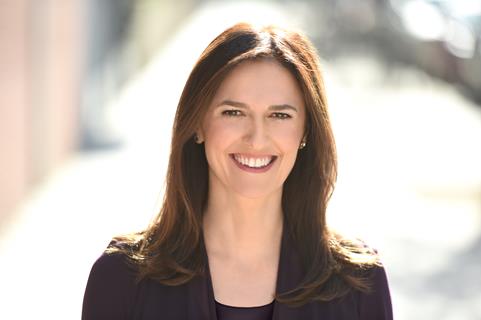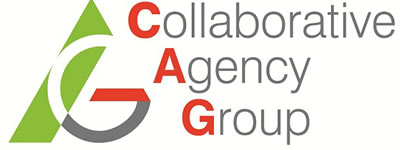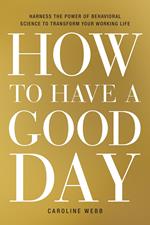
04 May How To Have A Good Day – Caroline Webb Speaker, economist and renowned leadership coach
Caroline Webb Speaker is passionate about using behavioral science to help people thrive.
We’ve found people are far more likely to embrace and remember a technique if they understand why it works. This deeper understanding also makes it easier for people to share the techniques with their colleagues.
Caroline Webb is a management consultant, economist, speaker, author and renowned leadership coach who has worked with hundreds of organizations to help their employees be more productive, energized, and successful – first as a Partner at McKinsey, where she continues to serve as a Senior Advisor, and now as CEO and founder of How to Have a Good Day. She specializes in showing people how to transform their life and work for the better by applying insights from the behavioral sciences: behavioral economics, psychology and neuroscience. Her book on that topic – How to Have a Good Day: Harness the Power of Behavioral Science to Transform Your Working Life – is being published in 16 languages and over 60 countries. It was hailed by Forbes as one of their “must-read business books,” described by Fortune as one of their top “self-improvement through data” books, and listed by Inc. as one of the best 15 leadership and personal development books of the past five years. It also won plaudits from publications as diverse as the Financial Times, TIME, and Cosmopolitan magazine.
Caroline Webb’s Book
How to Have a Good Day: Harness the Power of Behavioral Science to Transform Your Working Life
In How to Have a Good Day, economist and former McKinsey partner Caroline Webb shows readers how to use recent findings from behavioral economics, psychology, and neuroscience to transform our approach to everyday working life.
Advances in behavioral sciences are giving us an ever better understanding of how our brains work, why we make the choices we do, and what it takes for us to be at our best. But it has not always been easy to see how to apply these insights in the real world–until now.
In How to Have a Good Day, Webb explains exactly how to apply this science to our daily tasks and routines. She translates three big scientific ideas into step-by-step guidance that shows us how to set better priorities, make our time go further, ace every interaction, be our smartest selves, strengthen our personal impact, be resilient to setbacks, and boost our energy and enjoyment. Through it all, Webb teaches us how to navigate the typical challenges of modern workplaces—from conflict with colleagues to dull meetings and overflowing inboxes—with skill and ease.
Filled with stories of people who have used Webb’s insights to boost their job satisfaction and performance at work, How to Have a Good Day is the book so many people wanted when they finished Nudge, Blink and Thinking Fast and Slow and were looking for practical ways to apply this fascinating science to their own lives and careers.
A remarkable and much-needed book, How to Have a Good Day gives us the tools we need to have a lifetime of good days.
Caroline’s Speech Topics
How To Have A Good Day in Challenging and Uncertain Times
These are challenging times, full of uncertainty and radical shifts to the way we work. It’s not clear when there will be a real return to normal – or even what “normal” now means. There will undoubtedly be some positive legacies from the experience of living through the pandemic – for example, we can hope for more openness to flexible working models. But in the meantime, ambiguity and upheaval continues to take a toll on mental health and wellbeing, making it hard for people to be at their best. The good news is that there are certain simple mental habits that have been proven to immediately give us a sense of control, making it easier for us think calmly, clearly and creatively. Caroline will explain the science and practice of three techniques that that we can use both for ourselves and with our teams, to help us navigate these times with skill and grace.
Seven Sources of Energy for a Tired Brain
We’ve long been used to our jobs demanding a lot of us, especially when there’s a need to solve a new problem under pressure or to land a new opportunity against the odds. But around the world many professionals are working longer hours than ever, as we deal with unprecedented uncertainty and radically new ways of working. To continue to thrive in this kind of environment, it’s ever more important to know how to sustain our sense of wellbeing and motivation when we’re stretched and tired. Luckily, insights from the behavioral sciences can help us with that. Research tells us that there are a number of small interventions that can make a big difference to our ability to perform and feel at our best under pressure. In this talk, Caroline Webb will share some of her favorite science-based tips for boosting energy and resilience even on the hardest of days.
How to Have a Good Day, Scientifically Speaking
Whether we have a good day at work of course depends partly on luck. Who knows what crises will unfold today? But behavioral science shows us that we have more control over apparently random events than we think – we just need to understand a little about how the human brain works. Caroline Webb will demonstrate how tiny science-based tweaks to our daily routines can transform our experience of what happens around us, the number of hours in the day, our level of intelligence and even other people’s moods. With these practical insights in your back pocket, you’ll be able to change your “luck” and put many more good days within reach – both for yourself and your colleagues.
Futureproof Leadership in the Future of Work
The workplace is set to change dramatically in the coming years, as AI takes over our most repetitive and predictable tasks. But at our best, human beings still have distinctive strengths over even the most sophisticated robot: we can make wise decisions and creative choices in ambiguous situations; we’re able to be empathic and inspiring to our fellow humans in challenging times. To thrive in the future workplace, leaders will need to create team environments that allow their colleagues to play to those precious human strengths of wisdom, creativity, empathy and inspiration. Luckily, behavioral science is pretty clear on what it takes to enable those human strengths to flourish – and Caroline Webb will show how to use these insights to become a futureproof leader.
The Science and Practice of Sailing Through Setbacks
Setbacks and periods of uncertainty are inevitable in professional life, so our ability to handle challenging situations hugely affects our chances of long-term success. The good news is that behavioral science suggests there are plenty of ways to increase your resilience to ups and downs. Drawing on years of experience in leading organizational change projects at McKinsey and coaching clients through difficult times, Caroline Webb will explain several powerful, research-backed techniques to help you stay cool when things go wrong, get back on track after disappointments and handle ambiguity with skill. With these tools in your pocket, you can take more control of the quality of your days—and ultimately boost the effectiveness of your team, whatever challenges are on the horizon.
The Science and Practice of Making Your Time Go Further
We all want to make the most of the hours in the day, but it’s not always easy to see how to maximize our productivity when we’re surrounded by the always-on demands of modern professional life. In this talk, Caroline Webb shows how we can get things done with less stress, more focus and higher energy, by creating the conditions that our brains really need to perform at their best. Combining leading-edge research with her extensive coaching and consulting experience at McKinsey and Sevenshift, Webb will demonstrate a number of practical tips that have transformed her clients’ professional lives by boosting their efficiency, sense of achievement and work-life balance.
Contact the Collaborative Agency Group / Speaker Bureau 617-243-3889 or info@collaborativeagency.com



